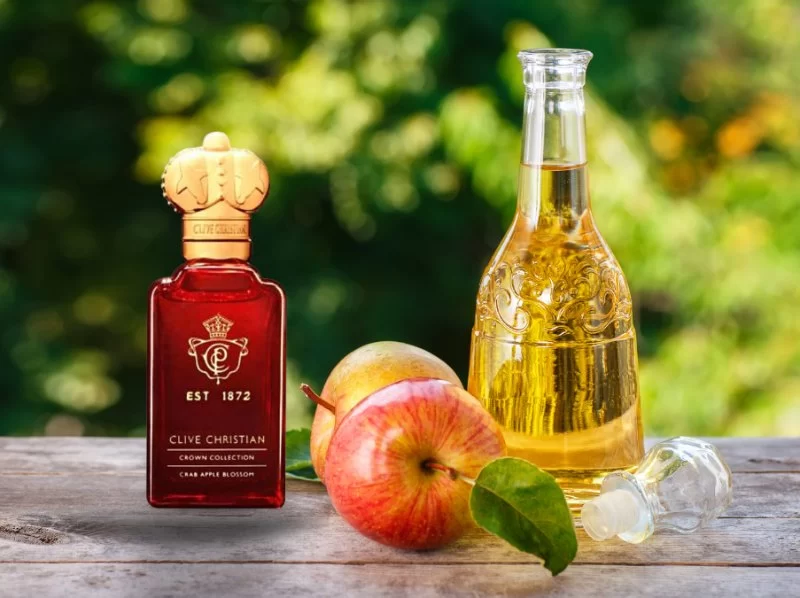- natural-compounds-in-apples—the-science-behind-fruity-and-floral-notes
- contamination-or-environmental-factors—how-storage-and-handling-can-alter-flavor
- artificial-residues-and-chemical-exposure—when-your-apple-smells-too-good
- taste-perception-and-individual-sensitivity—your-mouth-might-be-more-sensitive-than-you-think
- stories-from-real-eaters—when-an-apple-tastes-like-perfume
- understanding-scent-with-scent-snob—learn-how-smell-affects-taste
1. Natural Compounds in Apples — The Science Behind Fruity and Floral Notes
If you’ve ever asked, “Why does my apple taste like perfume?” — you're not alone. The answer might lie in nature itself. Many apple varieties contain naturally occurring esters and alcohols, the same aromatic compounds found in perfumes and essential oils.
1.1 Apples and Esters: A Natural Aroma Overlap
Compounds like ethyl butyrate and hexyl acetate are responsible for fruity, floral notes in apples. Interestingly, these same compounds are used in synthetic perfumes and flavorings. So when your apple tastes like perfume, it could be because it shares similar scent molecules — especially in sweeter or more aromatic varieties like Fuji or Honeycrisp.
1.2 Overripeness Can Intensify Scents
As apples ripen, these volatile compounds can become more concentrated. That sweet scent you associate with a fresh-picked apple can cross into overly fragrant — almost artificial — territory if the fruit is too ripe.
2. Contamination or Environmental Factors — How Storage and Handling Can Alter Flavor
Sometimes the perfume-like taste doesn’t come from the apple itself, but from where it’s been. Apples are porous and can easily absorb scents from their surroundings.
2.1 Storage Near Scented Products
If your apples have been stored near candles, cleaning supplies, or even perfumed personal care items, they can take on those smells. This is especially common in home pantries or grocery displays where scent control isn’t strict.
2.2 Fridge Transfer: A Real Phenomenon
Ever kept apples in a fridge drawer with strongly scented vegetables or leftovers? Odors transfer. A mildly floral hand soap, if stored close, can seep into produce over time. The result: a crisp bite that tastes oddly like a bath product.
3. Artificial Residues and Chemical Exposure — When Your Apple Smells Too Good
In rare cases, that perfume-like taste might not be natural or environmental — but chemical. Apples are often coated post-harvest with wax to preserve freshness, and sometimes this wax carries unintended scents.
3.1 Commercial Waxes and Additives
Though generally food-safe, some commercial apple coatings may contain aromatic preservatives or residue from machinery. If improperly handled, that “flavor” can cling to the fruit, especially if not washed properly before consumption.
3.2 Pesticide or Detergent Residue
Imported or conventionally farmed apples may have chemical residues if not rinsed or peeled. A slightly soapy or floral taste could signal leftover washing agents — another reason to thoroughly clean or choose organic when possible.
4. Taste Perception and Individual Sensitivity — Your Mouth Might Be More Sensitive Than You Think
Here’s where it gets personal: not everyone tastes things the same way. Your unique olfactory system could be interpreting a natural apple note as “perfumey” simply because of heightened sensitivity.
4.1 Hyperosmia: When Smells Are Too Strong
Some people experience heightened smell and taste perception. A note that seems faintly floral to one person might taste like full-blown perfume to another. If you’ve recently had a cold, hormonal changes, or started a new medication, your sense of taste might temporarily shift as well.
4.2 Taste Expectations and Disruption
If you expect an apple to taste purely fruity or tart, an unexpected floral note might register as “off” or chemical. The brain ties aroma closely to memory, so one unfamiliar note might remind you of perfume — even if it’s naturally present.
5. Stories from Real Eaters — When an Apple Tastes Like Perfume
On Reddit’s r/NoStupidQuestions, one user described biting into a Red Delicious that “tasted like Bath & Body Works.” Another mentioned Gala apples tasting like “they’d been sprayed with grandma’s cologne.” These stories aren’t rare — and they’ve sparked lively conversations about scent perception, food safety, and apple varieties.
Food reviewer Andrea Tan once posted a viral TikTok where she blind-tasted different apple types, describing one Honeycrisp as “like a fruit salad met a floral diffuser.” She later confirmed that the batch had been stored near strongly scented soaps at the warehouse.
6. Understanding Scent with Scent Snob — Learn How Smell Affects Taste
If you’re curious about the science of scent and taste — or you want to refine your aromatic palate — Scent Snob is an ideal place to start. From deep dives into natural esters to curated guides on sensory training, it’s a resource for anyone interested in the subtle power of smell.
6.1 Smell and Flavor Are Inseparable
The perfume-like taste in apples is a perfect example of how scent can hijack — or enhance — the eating experience. Understanding the chemistry and psychology behind it helps you appreciate food (and fragrance) on a deeper level.
So, the next time your apple tastes like perfume, you’ll know: it might be nature, nurture, or nose — and every bite tells a more complex story than you’d expect.


0 comments